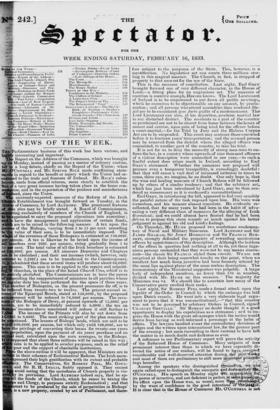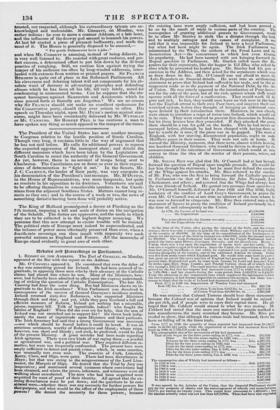NEWS OF THE WEEK.
arliamentary business of this week has been various, and interesting and important. Report on the Address of the Commons, which was brought Monday, instead of passing as a matter of ordinary routine, a long debate, chiefly on the Repeal of the Union ; when 'CONNELL and Mr. SPRING RICE made conflicting state- in regard to the benefit or injury which the Union hail oc- d to the trade and finances of Ireland. Mr. RICE'S calcu- , made from official returns, seem clearly to establish the a very great increase having taken place in the home con- ion, and in the exportation of the produce and manufactures d, since the Union.
anxiously-expected measure of the Reform of the Irish Establishment was brought 'forward on Tuesday, in the of Commons, by Lord ALTHORP. The prominent features plan may be briefly stated. A Board of Commissioners, mg exclusively of members of the Church of England, is ppointed to carry the proposed, alterations into execution ; have the management and application , of certain funds, are to be raised in'the 'follOwing manner. A tax upon. the of the Bishops, varying from 5 to 15 per cent, according value, of their sees, is to be immediately imposed. The of the revenues of these Bishoprics is estimated at 130,000/. num. A tax is likewise ,to be levied upon the income of efices over 2001. per annum, rising gradually from 5 to cent. The total value of all.the Irish benefices is estimated ,000/. per annum. All sinecure Deaneries and Chapters be abolished ; and their net incomes (which, however, only t to 2,2001.) are to be transferred to the Commissioners.' lculated that these several items will produce about 6-6,000/. num. This sum is to be applied to the repairs and rebuild-. churches, in the place of the hated Church Cess, which' is to 'rely abolished. The Commissioners are to have the power enclitig the reappointment of ministers to all parishes where ular duty has been performed for the space cf three years. mber of Bishoprics, as the present possessors die off, is to ced from twenty-two to twelve. The present annual in-
f the Episcopal Bench, stated at 130,0001., by the proposed ement will be reduced to 70,000/. per annum. The reve- the Bishopric of Derry, at present upwards of 12,000/. per are to be immediately reduced to 8,000/.: the tax on s incomes above mentioned will reduce it still further to
The income of the Primate will also be cut down from 1. to 9,000/. The most striking part of the plan remains to tioned. The lessees of Bishops' lands, which are said to be 600,000/. per annum, but which only yield 100,000/., are to e privilege of converting their leases for twenty-one years petuities, upon the payment of six years' purchase and an rent, calculated upon the corn averages, to the Bishops. pposed that about three millions will be raised in this way ; sum is to be applied to secular purposes, such as the relief poor and the support of charitable institutions.
the above outline it will be apparent, that Ministers are in in their schemes of Ecclesiastical Reform. The Irish mem- pressed their high gratification with its extent and probable y. The Conservatives, Sir ROBERT PEEL, Mr. GOUL- and Sir R. H. INGLIs, feebly opposed it. They cannot avoid seeing that the sacredness of Church property is vio- y its provisions. - Lord ALTHGRP indeed says, that he ap- 1 the funds of the Church, which he raises by taxing the $ and Clergy, to purposes strictly Ecclesiastical ; and that ount to be produced by the sale of perpetuities in Bishops' is a new property, created by act of Parliament, and there-. . . fore subject to the purposes of the State. This, however, is a. mystification. No legislative act can create. three millions ster- ling in this magical manner. The Church, in fact, is stripped of property to that amount for the use of the State. This is the measure of conciliation. Last night, Earl GREY brought forward one of very different character, in the House of Lords—a fitting place for an ungracious act. The measure of coercion is coercive enough, Heaven knows. The Lord Lieutenant of Ireland is to be empowered to put down all public meetings, which he conceives to be objectionable on any account, by procla- mation ; and all persons who attend assemblies thus rendered ille- gal are to be considered ipso facto guilty of a misdemeanour. The- Lord Lieutenant.can also, at his discretion, proclaim martial law ill any disturbed district. The residents in a part of the country so proclaimed are not to be absent from home between the hours of sunset and sunrise, upon pain of being tried for the offence before a court-martial,—for the Trial by Jury and the Habeas Corpus Act are to be suspended. This court may sentence those convicted before it to fourteen years' transportation; and the accused person. may be removed from the district where the alleged offence was committed, to another part of the country, to take his trial.
It is not for us to deny the necessity of strong measures to en- force thelaw, in a country where upwards of nine thousand offences of a violent description were committed in one year,—to such a. fearful extent does crime reach in Ireland, according . to Earl GREY'S statement. Whether the measures now proposed will procure even a temporary tranquillity, is exceedingly doubtful: that they will cause a vast deal of increased irritation in times to come, there can, we imagine, be no doubt. Our only hope is, that the wise and healing measure of Church Reform will be followed up by others of a similar tendency: and that the arbitrary act, which has just been introduced by Lord GREY, may be thus ren- dered as unnecessary as it is confessedly unconstitutional.
Earl GREY, in introducing the bill, appeared to feel very sensibly the painful nature of the task imposed upon him. His voice was tremulous, and his manner almost irresolute. He evidently re- collected, that for many years he had been in the habit of advo- cating a very different class of measures for the allaying of Irish discontent; and we could almost have fancied that he had been. _driven to propose this stern reniedy a:S.:much .against. his better judgment' as against his old and kindly feelings. . , On Thursday, Mr. HUME proposed two resolutions condemna- tory of Naval and Military Sinecures. Lord ALTHORP and Sir . JAMES GRAHAM, Sir JOHN HOBHOUSE and Sir FRANCIS BUR- navy, strongly defended the propriety of rewarding meritorious . officers by appointments of this description. ' Although tile holders of the offices in question had nothing at all to do, yet these inge- nious persons contended that they were not by any means sinecu- rists—the classic Sir. FRANC IS styled them emeriti.- We are not surprised at their being somewhat touchy on this point, when we recollect-how much fierce ,invective had been formerly uttered by the same,. lips against places of the same useless description. The . inconsistency of the Ministerial supporters was palpable. A large body of independent members, no fewer than 138 in number, divided with Mr. Holm on this occasion. - The majority for Ministers was 94. We should like to ascertain how many of the Conservative party swelled their ranks. Last night,- Sir ROBERT PEEL made a formal attack upon the legality of the Order in Council by which the embargo was laid upon Dutch vessels. He went into a very elaborate legal argu- ment to prove that it was unconstitutional,—" that this country was not to be governed by arbitrary Orders in Council, signed CHARLES GREYILLE." Sir ROBERT no doubt thought it a good opportunity to display his capabilities as a statesman ; and to im- press the House with the great advantages which the nation would derive from having so well-informed a personage at the helm of affairs. The lawyers bandied about the contradictory decisions a judges and the writers upon international law, for the greater part of the evening ; but seem (according to their custom) to have left
the matter in as much doubt and dulness as ever. ,
A reference to our Parliamentary report will prove the activity . of the Reformed House of Commons. • Many subjects of less prominent interest than those to which we have especially di- rected the notice of our readers, will be found to li .y)occiapied: 1 614.
considerable and well-deserved attention during paStrAU and most of them are preliminary to still more ' ...p, itOt
,t• - - .;.,/ , ---" :•-• •?:\.- AN
ings hereafter.
Among the speakers who distinguished se. .c....W„ ilre, again called upon to distinguish the energetic iinAdiehitOtbrill*45:14 i O'CONNELL. His speech on Monday night vires.4gliblello./., its power of invective, and not deficient in patho id sate - - "Ets-4"Y Its effect upon the House was, as usual, more by the want of confidence in the good intentions of 't'.' e),Rittor. It is clear that in the Louse of Commons Mr. aCONNELL is not trusted, nor respected, although his extraordinary talents are ac- knowledged and undeniable. Mr. CORBETT, on Monday, was rather tedious : he rose to move a counter Address, at a late hour, and the influence of the drowsy god seemed to benumb his powers. At last he started a piece of pleasant buffoonery, and made the most of it. The House is generally disposed to be amused,— " For gentle Dulness ever loves a joke:" and when Mr. COBBETT is amusing, instead of being didactic, he is very well listened to. He resisted with great coolness, and per- fect success, a determined effort to put him down by the ill-bred :practice of coughing. Still, we caution him against trying the temper of his audience too often by long-winded addresses, inter- larded with extracts from written or printed papers. Sir FRANCIS BtranErr is quite out of place in the Reformed Parliament. All his cleverness and debating talent will not compensate for his ab- solute want of decency in advocating principles and defending abuses which he has been all his life, till very lately, noted for condemning in unmeasured terms. Can he suppose that the elo- quent harangues against Sinecurists and Aristocrats which be once poured forth so fluently are forgotten ? We see no reason why Sir FRANCIS should not make an excellent spokesman for the Conservative party, should they ever return to office. His speech on Thursday night, upon Mr. HUME'S motion against sine- Cures, might have been consistently delivered by Mr. WINDHAM Or MT. CANNING. Sir ROBERT PEEL is too cautious a man to have spoken any thing so much opposed to the temper of the times.























